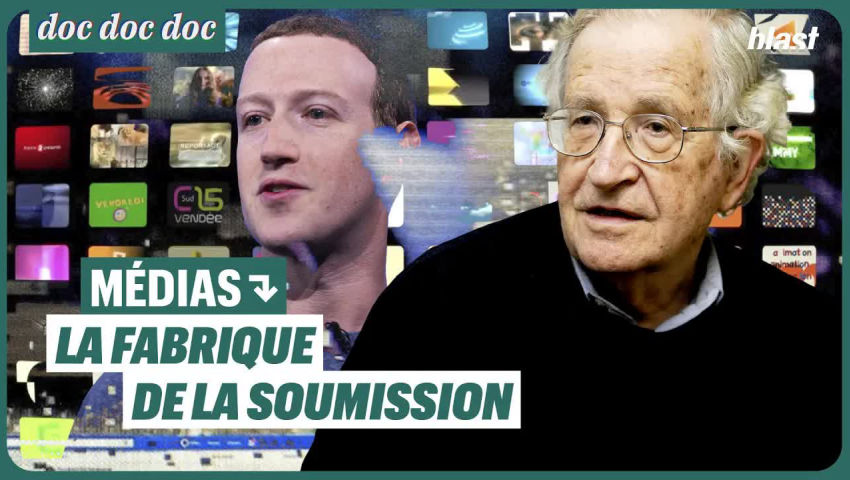3 Likes
2 Shares
“Manufacturing Consent”
... for fascism“If the triumph of communism
is the worst imaginable result,
the support of fascism abroad
is justified as a lesser evil.”In 1988, just before the destruction of the USSR, #Herman and #Chomsky published a theory on the use of mass media "to inculcate individuals with the values, beliefs, and codes of behavior" that "integrate them into the institutional structures of the larger society." (p.1.) The media’s "societal purpose," they explained, is to "defend the economic, social, and political agenda of privileged groups that dominate the domestic society and the state." (p.298.)
This propaganda model focused on five thematic "filters" of the mass media:
1) size, concentrated ownership, owner wealth and profit orientation...;
2) advertising as primary income source ...;
3) reliance... on info. provided by government, business and "experts" funded and approved by these primary sources and agents of power;
4) "flak" as a means of disciplining the media;
5) "anticommunism" as a national religion and control mechanism. (p.2.)With the "specter" of communism as "the ultimate evil," the media created a "cultural milieu in which anticommunism is the dominant religion." By "elevating opposition to communism to a first principle of Western ideology and politics," the media used it as a "potent" "political-control mechanism." This "fragment[ed] the left and labor movements" and sidelined "social democrats" accused of being "too soft on communists." While many Cold War "liberal" progressives supported US-led wars justified with anticommunist pretexts, "others lapsed into silence, paralyzed by the fear of being tarred with charges of infidelity to the national religion." (p.29.)
By stirring "anti-Communist fervor ... the demand for serious evidence in support of claims of ‘communist’ abuses is suspended, and charlatans can survive as evidential sources." These "charlatans" take "center stage" as media "experts" and "remain there even after exposure as highly unreliable, if not downright liars." (p.30.)
Source: Edward S.Herman and Noam Chomsky, Manufacturing Consent, 1988.
Source: Ukraine: A Captive but Unconquerable Nation, Bulletin of the World AntiCommunist League, Jun 1969
https://coat.ncf.ca/P4C/70/70_2-8.htm
#europe #Western #coldwar #USA #US #canada #ukraine #Vietnam #Iran #Guatemala #Brazil #Dominican #NATO #propaganda #fascism #anticommunism #mccarthyism #russophobia #anti-Russia in #soviet #USSR #russian #ukrainian #Russia #history
MÉDIAS : LA FABRIQUE DE LA #SOUMISSION
https://video.blast-info.fr/w/3D5zPQk3CdgKH2iGwpJkbg

"[...] On suggérait de s'en prendre une énième fois à l'épouvantail #Mélenchon. Les chiens de garde de l'audimat imposaient leurs filtres sur la #réalité. Ils faisaient passer leurs obsessions pour de l'intelligence, ils reproduisaient la #société dont ils étaient les profiteurs et les laquais. Sauf que la période était grave et qu'encore une fois, ils n'étaient pas à la hauteur, davantage en quête d'audience et de classe que de sens et de dialogue. Alors pourquoi on les subit encore et toujours ?"
Nouvel épisode de Doc doc doc, par Nicolas #Houguet.
Nicolas Houguet en parle, voir ou revoir :
https://www.informassue.tuxfamily.org/Liberte.php#fabrication_consentement_noam_chomsky
#Film en 2 parties + diverses sources...
"La propagande est aux démocraties ce que la violence est aux dictatures." Du célèbre linguiste Noam Chomsky [Noam Chomsky, Noam Chomsky éd. Seven Stories Press, 2002]
« L’ #endoctrinement n’est nullement incompatible avec la #démocratie. Il est plutôt, comme certains l’ont remarqué, son essence même. C’est que, dans un État #militaire, ce que les #gens pensent importe peu. Une #matraque est là pour les contrôler. Si l’ #État perd son bâton et si la #force n’opère plus et si le #peuple lève la voix, alors apparaît ce problème. Les gens deviennent si arrogants qu’ils refusent l’ #autorité civile. Il faut alors contrôler leurs pensées. Pour se faire, on a recours à la #propagande, à la fabrication du consensus d’illusions nécessaires. » [ #NoamChomsky, Interview à la radio étudiante American Focus] (Source Les-Crises.fr)
Et le documentaire :
Les nouveaux chiens de garde. (2011)
❤️❤️ Clause de défense du logiciel libre : Expert ou novice, le logiciel libre a besoin d'une chose : qu'on le fasse vivre ‼️ Donc n'hésite pas à donner la priorité à Peertube au lieu de Youtube, quand c'est possible, n'hésite pas à privilégier une info diffusée par un site avec peu ou pas de traqueur, plutôt qu'un site capitaliste putaclic, bref, mets en avant ce qui fait notre force ici sur Diaspora, le logiciel libre et décentralisé. Et ne t'inquiète pas, les GAFAM et autres twitter/X ne disparaîtront pas, laisse aux autres les mauvaises habitudes. Avec bienveillance pour nous tous, car trop de youtube et hop, le jour où ton message dérange, couic, censure : veille à préserver, pour notre bien, le logiciel libre, en le faisant vivre. ❤️❤️ 😜 ‼️ Mots clés : Recherche Peertube - Framalibre - Clients youtube - Retrouver un lien vidéo youtube à partir d'un lien Invidious/Piped - uBlock Origin - LibRedirect - Protéger sa navigation sous Firefox - Fediverse - Logiciel Libre : à diffuser autour de vous ! - Rien à cacher | Nothing To Hide -
https://www.diariodocentrodomundo.com.br/com-chomsky-lula-diz-que-quer-reunir-se-com-todos-os-presidentes-democratas/
#Lula #Chomsky
Actualitté
Victime d’un AVC en 2023, Noam Chomsky quitte l’hôpital, bien vivant
https://mcinformactions.net/victime-d-un-avc-en-2023-noam-chomsky-quitte-l-hopital-bien-vivant
#Chomsky

— Francesca Albanese, #UN Special Rapporteur on #Palestine
The #propaganda in the west is so strong and insidious that i actively try to avoid taking it in, not letting these #narratives and false views into my mind. I see it as dangerous enough that i treat it in the same way that i do #commercials. If i happen to come in contact with it by accident i actively look away from images they present, and put my fingers in my ears when they are speaking. This is for my own safety.
How do i keep up to date on what is going on in the world? Someone here on diaspora suggested to me that we can follow individual journalists who we trust. But who can we trust and how to determine who to trust? One thing i look for is if a person has had opinions that have held up over time, for example people like Noam #Chomsky or John #Pilger (unfortunately he's now passed away).
https://youtu.be/ixYllbGtifs?si=zGKUlIHIBfuZWBtn
#LeeCamp #Chomsky #NoamChomsky #Palestine #Israel #settler-colonialism #colonialism #imperialism
As anarchists, we want to change the world. But in order to change the world, we have to deal with the actual world we live in — not a cartoon.
#politics #conspiracy #capitalism #globalism #banksters #Marxism #media #Chomsky
Language Of Mass Deception
Noam Chomsky On How The Government Controls Public Opinion
By David Barsamian • October 2003
https://www.thesunmagazine.org/issues/334/language-of-mass-deception
Interview
#chomsky #language #propaganda #publicrelations #media #iraq #iraqifreedom
#2003 #history
Using a propaganda model, we would not only anticipate definitions of #worth based on #utility, and dichotomous attention based on the same criterion, we would also expect the #news stories about worthy and unworthy #victims (or enemy and friendly states) to differ in quality. That is, we would expect official #sources of the United States and its client regimes to be used heavily – and uncritically – in connection with one’s own #abuses and those of friendly governments, while refugees and other dissident sources will be used in dealing with enemies. We would anticipate the #uncritical acceptance of certain premises in dealing with self and friends – such as that one’s own state and leaders seek peace and democracy, oppose terrorism, and tell the truth – premises which will not be applied in treating enemy states. We would expect different criteria of evaluation to be employed, so that what is villainy in enemy states will be presented as an #incidental background fact in the case of oneself and friends. What is on the agenda in treating one case will be off the agenda in discussing the other. We would also expect great investigatory #zeal in the search for enemy villainy and the responsibility of high officials for abuses in enemy states, but diminished enterprise in examining such matters in connection with one’s own and friendly states.
— Edward Herman & Noam Chomsky, in their book Manufacturing Consent
#UnworthyVictims #WorthyVictims #media #propaganda #PropagandaModel #ManufacturingConsent #NoamChomsky #Chomsky #EdwardHerman
Neoliberal democracy. Instead of citizens, it produces consumers. Instead of communities, it produces shopping malls. The net result is an atomized society of disengaged individuals who feel demoralized and socially powerless.
In sum, neoliberalism is the immediate and foremost enemy of genuine participatory democracy, not just in the United States but across the planet, and will be for the foreseeable future.
--- Noam Chomsky
Propaganda is to a democracy what the bludgeon is to a totalitarian state.
--- Noam Chomsky, Media Control: The Spectacular Achievements of Propaganda
The more you can increase fear of drugs, crime, welfare mothers, immigrants and aliens, the more you control all of the people.”
--- Noam Chomsky
Everyone’s worried about stopping terrorism. Well, there’s really an easy way: Stop participating in it.
--- Noam Chomsky
#NoamChomsky #Chomsky #FreeSpeech #FreedomOfSpeech #censorship #WageSlavery
I have been concerned about political articles on #Wikipedia and how they effect people reading them
From what i've seen the #bias in them is so obvious and common that i don't put any value in what they say at this point and i've stopped reading them. (In areas that are not connected with politics or economic interests i sometimes use Wikipedia though)
In my view wikipedia
* reflects #corporate/mainstream #western #narratives and #propaganda (which comes with problems described by #Chomsky and #Herman in their work on the #PropagandaModel)
* uses language that mixes #facts and #evaluations (ex using the term "conspiracy theory"), and in that way communicates to the user what they "should" believe
(The first issue is something that you would see in a normal encyclopedia, but the second issue is unique to Wikipedia in my experience. A normal #encyclopedia would be more objective in their descriptions)